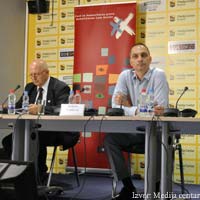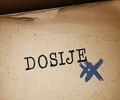Report “Judging with impunity: The role of prosecutors and judges in show trials of Kosovo Albanians in the period 1998-2000” presented

On Tuesday, July 25th, 2017, the Humanitarian Law Center (HLC) presented the report “Judging with impunity: The role of prosecutors and judges in show trials of Kosovo Albanians in the period 1998–2000” . The Report points to a number of violations of fundamental human rights committed during criminal proceedings against Kosovo Albanians in the period 1998-2000, before district courts in Serbia.
Opening the discussion on the Report, HLC Executive Director, Budimir Ivanisevic, stated that the HLC actively participated by monitoring trials and hiring lawyers to provide legal protection to the defendants. He said that the Report analyses the manner in which the prosecutors and judges in these proceedings acted, the failure to investigate numerous allegations made by defendants that torture and inhumane treatment were used against them during preliminary proceedings to extract confessions from them, the denial of the defendants’ right to be given adequate defence, the right to the assistance of an interpreter, the right to be served with a judgment in writing within the time limit prescribed by the law, and the right to present evidence and have their evidence examined in accordance with the law, along with other violations, all of which amounted to gross violations of the right to a fair trial as guaranteed by the domestic and international regulations which were in force at the time.
Mihailo Pavlovic, the author of the Report, stressed that the defendants were mainly accused of the intention to undermine the constitutional order and security of the FRY, becoming members of terrorist or sabotage-terrorist groups, participation in the setting up of terrorist groups or gangs, standing armed guard, participation in digging trenches, setting up barricades, etc.
The judicial proceedings were rather uniform as regards rights violations. The indictments for the most part rested on the confessions the defendants gave to the police or investigating judges – which they retracted at the main trials, asserting that the confessions had been extorted. In addition, many of the indictments were based on the testimonies of witnesses whose credibility was called into question, while the vast majority of the indictments were based on the so-called “paraffin test”, which has in general already been abandoned as evidence, since it was found not to represent a reliable indication. The judges, however ignored these deficiencies, including the allegations of the defendants that the confessions were extorted by torture, even when the medical documentation confirmed the existence of body injuries. Custodial sentences were pronounced, sometimes solely on the basis of the statements that the defendants had made to the police or investigating judges, which they themselves contradicted before the court. Some defendants received prison sentences, on the grounds that they had committed a criminal offense, despite the existence of detention orders proving that at the time of the commission of the crimes in question they had already been detained. All these judgments were characterized by the absence of justification, as well as the absence of an assessment of the evidence produced. What is more, almost none of the judgments made any mention of the elements of the crimes in question, the criminal responsibility of the defendants or their intention to commit the crime.
The passing of the Amnesty Law brought an end to these proceedings. The Amnesty Law provided a bar to further prosecution, release from prison, and removal of convictions from the official records. However, the criminal act of terrorism was not covered by the 2001 Amnesty, as a result of which it can still be prosecuted. The next Amnesty Law, of the year 2002, granted amnesty to those persons who had committed or were suspected on reasonable grounds of having committed the criminal acts of terrorism and the criminal act of association for the purpose of conducting hostile activities under the Criminal Code of the Federal Republic of Yugoslavia, in the territory of the municipalities of Presevo, Medvedja and Bujanovac, between 1 January 1991 and 31 May 2001. The amnesty also entailed immunity from further criminal prosecution and release from prison.
Pavlovic emphasized that the Report, in addition to documenting violations of the rights of the accused, shows that the majority of judges and prosecutors who handled these cases still hold judicial offices. While some have remained in their jobs, many were promoted and now serve among the highest-ranking judges or prosecutors in Serbia.
Teki Bokshi, a lawyer from Djakovica and one of the HLC lawyers who represented the defendants, recalled the criminal proceedings against the so-called “Djakovica Group”, in which all 145 persons were convicted of terrorism. The Supreme Court of Serbia ruled to set aside the judgment and to return the case to the court of first instance for a retrial. After several years of delay to the trial, Teki Bokshi, in his capacity as legal representative of the accused, filed a Request for establishing a violation of the right to trial within a reasonable time. The Constitutional Court of Serbia found a violation of the right to trial within a reasonable time, after which the Prosecutor’s Office withdrew the indictment. This created conditions for initiating proceedings for the right to compensation for unjustified deprivation of liberty.
Asked by a Beta news reporter why the Report is being published 18 years after the events it describes, Mihailo Pavlovic reminded those present that the Report’s primary purpose is to highlight the role of prosecutors and judges in these proceedings, and to raise the question of their worthiness to perform state and judicial functions today.
The Founder of the HLC, Natasa Kandic, informed the participants that back in 2001 the HLC prepared a report on trials held from 1997 to 1999, which included interviews with over 400 prisoners on the circumstances under which they were arrested. She pointed out that the political trials of the Kosovo Albanians, described in the Report, constitute a difficult issue that continues to burden Albanian-Serbian relations, especially considering that there are often public allegations that the prisoners who were amnestied are war criminals. She also stressed that it is important to raise the question about what constitutes the dignity of judges during a war.
At the end of the conversation, Izabela Kisic from the Helsinki Committee for Human Rights, said that the Report was extremely important. As a journalist during the ‘90s, she had had the opportunity to monitor some of the trials covered by this Report, and shared with the audience her observations about the media propaganda at the time, where the defendants were almost as a rule proclaimed to be terrorists.








